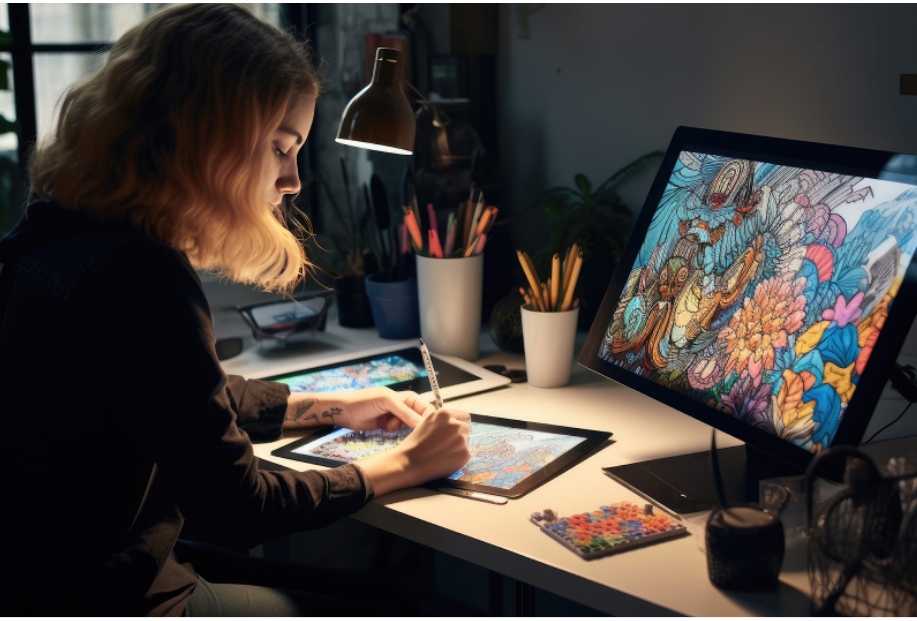AI is not expected to completely replace graphic designers but rather complement and enhance their work, increasing efficiency and productivity. While AI can automate tasks and improve quality control, it lacks the emotional and cultural context that human designers provide. Designers need to upskill and consider the ethical implications of AI in their work. The future implications of AI in graphic design include more user-centric and data-driven approaches, improving user engagement. However, there is a concern that AI may lead to a more standardized design culture, potentially impacting the diversity and originality of human creativity. Designers must strike a balance between AI and human creativity to create innovative and impactful designs that meet client expectations.
Human Creativity and Understanding
One of the main reasons why web and graphic designers will remain relevant is the unique creativity, intuition, and understanding they bring to their work. Design is not just about creating visually appealing elements but also about conveying emotions, messages, and brand identities effectively. Human designers have the ability to interpret complex briefs, understand cultural nuances, and infuse designs with a personality that resonates with target audiences.
Brand Identity and Strategy
Web and graphic designers play a crucial role in developing brand identities and strategies for businesses. They work closely with clients to understand their vision, values, target market, and positioning. Designers translate these insights into visual elements that reflect the essence of a brand. This strategic aspect of design requires human judgment, creativity, and problem-solving skills that AI tools currently lack.
Adaptability and Innovation
Design trends evolve rapidly, and staying ahead of the curve requires adaptability and innovation. Human designers have the ability to experiment, think outside the box, and push boundaries creatively. They can anticipate future trends, incorporate user feedback, and continuously refine their designs based on changing preferences. This level of adaptability and innovation is a key strength of human designers in an ever-evolving industry.
While AI tools can assist designers in generating ideas, automating repetitive tasks, or speeding up workflows, they are not yet capable of replacing the holistic approach that human designers bring to the table. The combination of technical skills, artistic vision, empathy for users, strategic thinking, and cultural awareness makes human designers indispensable in creating impactful visual experiences.
AI Software for Designers
Adobe Firefly stands out as one of the best AI software tools for web and graphic designers. It offers a powerful suite of AI tools that can assist in generating stunning text effects, transforming text into images, recoloring vectors, and creating custom color variations. Adobe Firefly integrates seamlessly with Adobe’s Creative Cloud programs like Illustrator and Photoshop, making it a familiar choice for designers already using Adobe products. The software’s text-to-image generator allows users to customize their output and tweak generated images to meet their creative vision. With features like generative fill and a vast training dataset of Creative Commons and Adobe Stock photos, Adobe Firefly is a valuable tool for designers looking to enhance their creative projects.
Uizard is another top AI software for web and graphic designers. It offers an intuitive platform for designing websites, mobile apps, and desktop software with its drag-and-drop design elements. Uizard’s AI features include a text assistant, text-to-image generator, theme generator, and the ability to turn sketches or screenshots into digital mockups. The software is user-friendly and provides both freeform design options and templates to streamline the design process.
These two AI software tools, Adobe Firefly and Uizard, are highly recommended for web and graphic designers seeking innovative solutions to enhance their design workflows.
In conclusion
Web and graphic designers will remain essential in 2025 due to their unique combination of creativity, strategic thinking, adaptability, innovation, and human touch that AI tools cannot fully replicate. Although AI can enhance efficiency in graphic design, the significance of human creativity, understanding, and strategic thinking is paramount. Designers must strike a balance between using AI tools and leveraging their personal skills to create impactful designs that satisfy client needs. Adobe Firefly and Uizard are top AI software tools recommended for designers looking to enhance their creative projects and streamline workflows.
